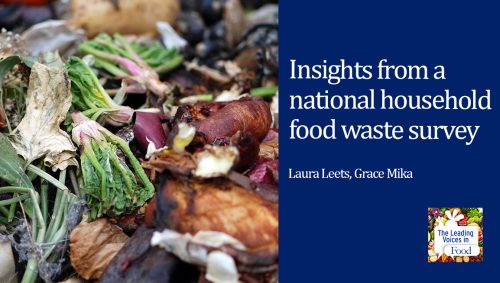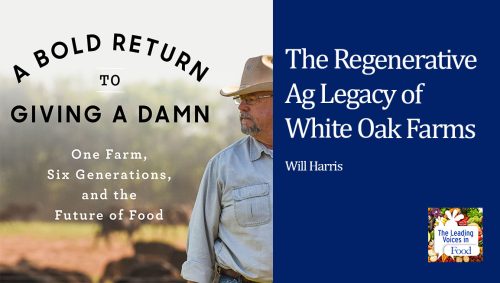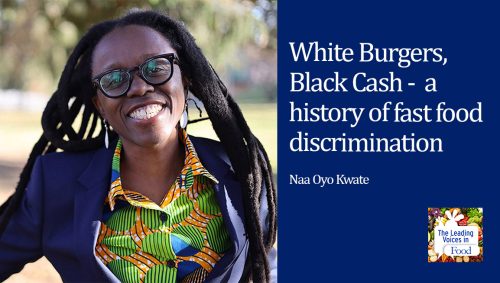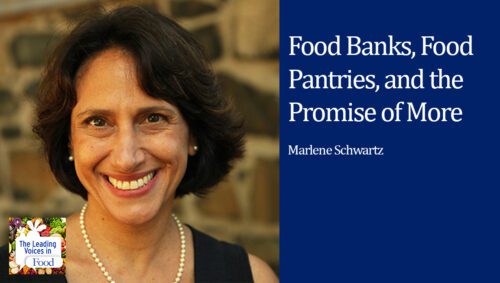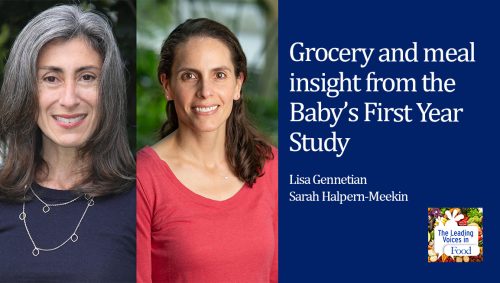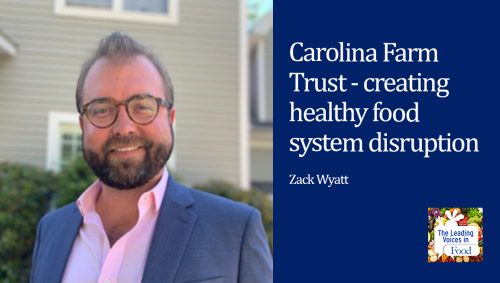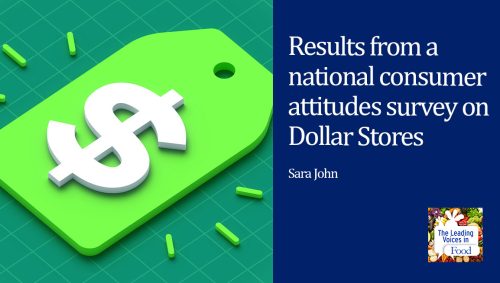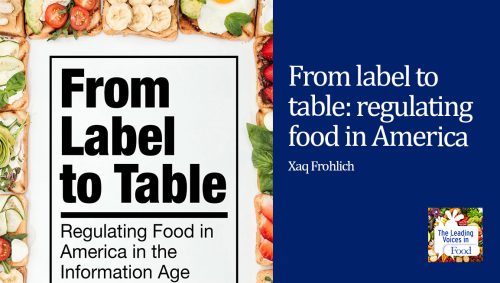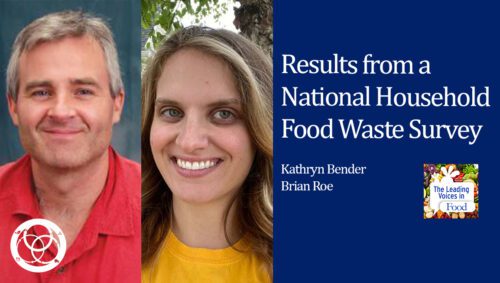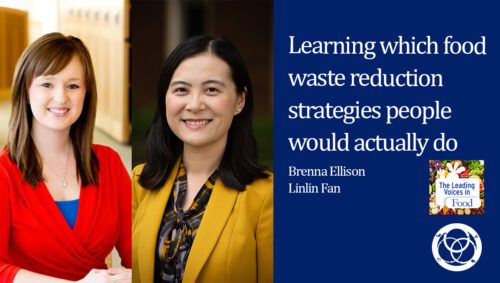The Leading Voices in Food
E225: Efficient Food Recovery and Waste Prevention – a Business Strategy
Our guest today is Jasmine Crowe-Houston, social entrepreneur, and founder of Goodr.co. Jasmine started her journey cooking soul food for hungry unhoused people in her kitchen in her one-bedroom apartment in Atlanta. She fed upwards of 500 people a week for years with pop-up kitchens and parks and parking lots. Then in 2017, she founded Goodr, a technology-based food waste management company that connects firms with food surpluses to nonprofit organizations that can use the food. She has worked with organizations that have food waste issues, such as the Atlanta International Airport, Hormel Foods, and Turner Broadcasting. Today, Goodr has expanded nationwide and sponsors free grocery stores and schools. She has combined charity, innovation, and market-based solutions into a for-profit waste management company that Inc. Magazine called a rare triple win.

Jasmine Crowe-Houston is the creator of Goodr, a tech-enabled sustainable food waste management company that strives to eliminate hunger and save food from landfills. Through her years of work feeding vulnerable populations, Jasmine saw a great opportunity for technology to solve a real problem: hunger. In January 2017, Jasmine founded Goodr, a food management platform that allows users in the food industry to track and redirect surplus food. She’s a proud alumna of North Carolina Central University. A resident of Atlanta, Georgia, she enjoys spending time with her family and friends and being a new mom to her daughter Journey. She is an avid traveler who has visited more than 30 countries. Jasmine sits on several nonprofit boards and continues to use her time for good. She was named by Entrepreneur Magazine as one of the top 100 influential female founders and recognized on the Black Enterprise 40 Under 40 List.
Interview Summary
Would you describe what Goodr is today?
Goodr is a blessing. We are a sustainable food waste management company that leverages technology to connect businesses that have excess food to non-profit organizations that can use that food. And at the same time, we have a line of business, which is Hunger Solutions, and we’re helping brands and government and other municipalities rethink how hunger is solved in their communities. We believe that hunger is not an issue of scarcity. It’s really a matter of logistics. And so, we are using technology and logistics to drive out hunger and food waste. We’ve built technology that includes our mobile app and portal. Imagine you are using an Uber Eats or DoorDash app. You go onto your favorite restaurant; you click the item that you want. Similar experience for our users. So, for example, a restaurant in the airport. Their menu is in our system. They click chicken sandwich; they tell us 50. Our platform is going to calculate the tax value of those sandwiches, the approximate weight of those sandwiches, and our algorithm is automatically matching those sandwiches with the non-profit that is serving 50 or more people that can take those items and then get it distributed to people in need. Another big thing that our technology is capturing is the poundage that we’re keeping out a landfill. So, it’s really important because we’re able to tell our clients we have kept 2 million pounds of food from landfills. This is equal to this much CO2 emissions that you’ve helped to prevent. We do a lot of fun gamifications as well, but we’re data-driven and we believe that you can’t manage what you don’t measure. And for too long, people have thrown everything away. They’ve never measured it. And now we’re giving them real insights and they’re seeing things like, wow, my number one wasted thing is pork. Why am I making pork so much? Maybe people here at our offices don’t eat pork. Start to make changes. So, we really work on the source reduction, but the number two on the EPA is the food hierarchy chart is feeding hungry people. And so that’s really where we are.
Wow, that’s amazing. I want to ask because I’ve seen this in the food waste and food donation world, that sometimes food that’s donated isn’t appropriate or fit for human consumption. What happens to those food products?
Traditionally, they end up in landfills. One of the big things that we have to do at Goodr, and I’ll tell you too, that change is by county. So, think of not by city, not by state. Wake County and Durham County probably have different rules because it’s based off the health department in each city. So, a good example is when we were working in Florida, what we do in Miami is absolutely illegal in Fort Lauderdale. They’re 10 minutes away from each other. Broward County and Dade County have different rules. So, we spend a lot of time, our R&D team, creating quality assurance checklists. And we know this food is going to live for three hours. So, you’ve got to get this either cooled, frozen, or donated within three hours. So, we tell our businesses that. We are moving food in an average of about 30 minutes from the time it gets picked up. Some of our customers will put in their pickup requests and ask that it’s picked up the next morning. So, they’re going to automatically put it in their refrigerator. That’s their comfort level. They feel a lot better. It makes the food last longer and they don’t always have to worry about it being fresh. A lot of the time when we’re dealing with weddings, really big events, that’s when we have to move right away because maybe that business doesn’t have access to the kitchen the next day. And so, we need to move a little bit differently. Most of the time when a business has food that’s passed that timeframe, they typically do throw it away. But what we’ve done is we’ve introduced organics recycling into our fold. So, our customers now have the ability to send that to an animal farm. We can also send it to an anaerobic digester and turn it into an organic product, or we can compost it. We’re still keeping it out of landfill. It doesn’t have to end up in landfill ever. That’s the positive.
Yeah, that’s amazing. I saw your 2019 Ted women talk entitled “What We’re Getting Wrong in The Fight to End Hunger.” And it has been viewed by more than 2.2 million times.
Wow. Yeah, it’s so good. I didn’t know if you gave me those last million, but that’s good to know.
Good job! No, it was over that by the time I got to it, but it’s really amazing and I’m just intrigued to get your opinion about why do you think people are interested in solving hunger and food waste?
I think people are questioning why it hasn’t been solved yet. It’s almost like it’s not as big as cancer, right? But it’s as big as cancer. Cancer’s big, it kills people, right? But we spend a lot of money and there’s a lot of research and we feel like we’re getting closer to the fight. I don’t know if people feel that we’re getting closer to the fight as it relates to hunger. And if you think about it, Norbert, when me and you were kids, we probably did a canned food drive. Anybody that’s listening right now is probably thinking, “I did some kind of a food drive when I was in elementary school to solve hunger in our communities.” Why are we still doing that? Why are we still doing the same things? I always look at it as being the definition of insanity, right? Doing the same thing over and over again and expecting a different result. I think that’s what people are interested in. What are we getting wrong? Why is my kid, 35 years later, why am I still doing canned food drives for my kindergarten kid and this is something that I did in kindergarten? And is this moving the needle? Is this really working? People want to know that. People want to know are we pacifying problems or is the money that we’re putting behind these actually driving solutions and should we look at something else that’s different? Even with my TED Talk, I remember the first week it came out, we got a lot of, “Oh, you’re talking negatively about food banks, and they do great work and I volunteer at the food bank every weekend.” There’s a whole section in my TED Talk where I say food banks and food pantries are vital. They play a pivotal role, but they don’t solve hunger alone, and we need to be open to doing new things. We’re using technology in every other area of our lives. I mean, we’re getting our groceries delivered, we’re meeting our spouses, we’re going to college. Why are we not using technology to try and solve a big problem like hunger and food waste? And so, it’s just getting people open. I think that’s what people are interested in finding a solution.
I’m really intrigued by the model of Goodr, the fact that it is a for-profit company. What’s also interesting is given all the success that you’ve had up to this point, it’s hard to believe now that investors hesitated to support you.
Yeah, shame on those investors, I would say. I’ll tell you, Norbert, the sad thing is, right, any woman listening should know this. Women as a whole get 2% of all venture capital funding from investors as a whole. So, you take a pie and then you take 2%, and now of that 2%, you have women that are Asian, women that are Black, women that are Hispanic, women that are White. We’re all taking a piece of that small 2%. So, there’s part of that. I think another thing is it’s hard to sometimes get conviction around that, which you don’t understand. And a lot of investors, quite frankly, have never been hungry, you know? They don’t really understand food waste. It’s probably not… It’s not AI, it’s not blockchain, it’s not crypto. It’s not always in the headlines. It’s not the cool thing. So, I think those all played a factor in it. I think that’s just the reality. Investors like to invest in things that they can get excited about, and sometimes hunger and food waste just are not exciting. I also think a lot of people felt like this is so good, they should be a nonprofit. And for me, I saw the business case in what we were building right away because businesses were already paying to throw food away. That’s the simple thing about it. So why would I create a nonprofit and must ask everyday people to donate so that we can get this food picked up, have to rely on volunteers that may or may not come, which possibly would cause more food to go to waste. Because if you’re being paid to pick something up, you’re being paid to do something, you’re 99% more likely to go, right? If you’re volunteering and it’s raining, you may not go that day. It doesn’t matter how much you care about the cause. You may not want to get in your car, you may not like to drive in the rain. Those are the things that happen. And so I also believe that businesses would value what they pay for. So, if you’re investing and you’re paying in a service to divert your food waste from landfill, you’re more likely to make sure that your employees are actually packaging that food, recording it for donations, scheduling pickups, than you would be if it was just a free thing, and it was a nice to do. I think that was kind of like we needed to prove that, and now we’ve proven. We have world-class customers. We work with… You name some of them. And I mean, we’ve worked with everybody from the NBA to Google to Oracle, Nike World Headquarters. These are our customers, you know? People have now seen that this works. One of our biggest customers, they sent over a testimonial the other day and it says, “All the other locations are banging down my door to try and get Goodr.” People just needed to give it a try. And so now hopefully when we have those investor conversations the next go around, this market’s a little crazy, but hopefully we’ll have a bit more willingness to give our solution a try. And there have been great investors who have made an investment in what we’re doing.
Right. Thank you for sharing that. And we’re at a university and we have a lot of young people who are excited about social entrepreneurship. What can you say to them to encourage them along this path?
I could say to them that they are needed. We were talking about my goal of wanting to be a professor one day, and what I want to talk about is social entrepreneurship and this model of being able to do well by doing good. That there is a way to do that in business and that it ultimately works. And we’ve seen the big companies that I think are pretty keen and they’ve seen success for are your Warby Parkers, your Patagonias. These are other B Corps, Goodr is a B Corp as well, who are kind of existing. The first model I ever saw of social entrepreneurship was Toms Shoes. They were really popular maybe 15 years ago, maybe not as much now, but there was a point when it was like, I’m going to buy a shoe and give a shoe. Bombas, the sock and undergarment company, the same thing. They’re supporting homelessness. You buy a sock, you’re giving a sock, you buy a T-shirt, you’re giving a T-shirt. People love to do good. And so, these students that are interested in creating ways and solutions to solve some of our biggest problems, are needed now more than ever. I mean, this world is… I read an article the other day talking about all that millennials have lived through. And I was thinking to myself, goodness gracious, I’ve lived through a lot, two recessions, a couple of wars, a pandemic, just like everything, technology. I mean, that’s the reality of it. I don’t recall a smart cell phone when I was in high school and college. That was… I think the iPhone came out maybe in 2008, 2009. I graduated college by then. I didn’t have that. Facebook wasn’t around until 2008. You start to see what’s happening to young people now because of social media, their self-esteem, the anxiety. There are so many things that we need people to be addressing because we’re creating a lot more technology, but we’re also creating a lot more problems, and they need to be solved.
They do. And it is interesting to think about the anxiety that’s associated with some of these issues.
Oh yes.
And the fact that Goodr is trying to address food waste, which is a contributor climate change, I mean, you’re providing a solution. And this is great and it helps me think that our students can start to think differently about what they can do to help address these issues.
The Project Drawdown, which is pretty much a leading climate solutions organization, they named, in 2022, food waste. Reducing our food waste is number two after fixing our energy grid. Number two thing that we could do to combat climate change is to reduce our food waste. In America, nearly 2% of GDP has been on food we never eat, which is just insane to think about. 2% of everything that we spend is on food we never eat, from production to transportation to the disposal. And so even around the food waste chain, there’s still a lot more solutions that are needed. So even if that’s going to be what we’re producing at the farm level, what’s going to waste? What can we do with it? Can we reuse it? Can we turn things into other products? I was reading an article recently about there’s a new kind of leather that’s going to be… It’s already kind of on some runways, but it’s made out of banana peels. That’s a social entrepreneur that thought of that.
I love the fact that you’re so welcoming and you’re trying to bring people in. And that brings up the book that you’ve published recently, “Everybody Eats,” and it’s there to inspire young people in the fight against hunger. It is beautiful. And I see my daughter in this text and so I’m really appreciative of it. And it was illustrated by Nadia Fisher. And there is also a website with resources for parents and kids and teachers. What do you want to accomplish with this outreach effort?
I am often asked, will I solve hunger in my lifetime? I want to say yes, but I have to think possibly not. Hunger grows every single year. I mean, there’s a new study I just was reading that it was in the Washington Post two days ago. It’s increased 12%. Childhood poverty is up 20%. So sometimes I’m going, or you make the shot, we’re at Duke, right? This is a basketball place. So, you make this shot and you can’t keep your hand there because the team is already down, the other team’s already on the other side of the court. That’s often how I feel about hunger. It’s like I do something that’s really good. It’s monumental. We’ve got grocery stores in schools, we’re feeding students, and then I read that childhood poverty is up 20%. How do I leave a legacy that really focuses on solving hunger? I need to inform the next generation and I need to do it in a way, and how I wrote that book is really my story in the eyes of a kid. Me learning that one of my friends, my college roommate did not have food in her household, and that shaping my whole life. And now thinking like your daughter, what would she come back and tell you if she learned that a friend of hers at school doesn’t have food in her kitchen like you have food in your kitchen? And they ask questions, and they want to understand that. She goes on this journey asking grocery stores and her school like, “Hey, what’s going on with this food? People are going hungry. My friend at school doesn’t have access to food,” and she’s trying to help her friend. And the reality is just like with my friend and the young protagonist in the book, her father just lost the job. I mean, so many people read these stories. I think the most recent article I saw said something like 75% of Americans are living… Are one paycheck away, just one paycheck away. And to see that, that happened to my friend, and it’s the most jarring thing that has ever happened to me, probably in life. Because I had a completely different picture in my mind of what hunger looked like until that happened to me. And this happened to me probably three years into feeding people that were experiencing homelessness on the street. I’ve been feeding people for over a decade of my life. To learn that someone who had volunteered with me, someone who had been out feeding people with me, that they too wouldn’t have food in their home, it changed my whole life and my life story. I use all the proceeds from the book to fund a Neighborhood Eats program where I feed kids on the weekends, and I know that I’m making an impact in the lives of children. And they will. My hope is in 15, 20 years, you’ll be sitting here talking to someone else who’s doing something around this. That’s the goal.
You’ve touched on this, but I just want to push it a little bit further. Food waste and hunger are longstanding challenges and they touch people all along the supply chain. How do you manage the complexity of this problem?
Yeah, I think we have to continue to focus on the verticals that we’re really good at because it is big. You’ll probably think I’m lying to you, Norbert. I may get a hundred phone calls and emails a week. “Hey, we need Goodr here. We want it… How can I bring this here? Can I bring this to my community? I need food. My senior home needs food. The trailer park that we live in, a lot of us are… It’s rural. We’re not near a grocery store.” I look at myself as trying… I think it’s like hero overload. I’m trying to solve all this. How do I get to Canada? Oh, someone just called me from Denmark. How do we go to Denmark? How do we get here? I think what I have to really focus on is US first. I do really well with large scale venues, colleges and universities, enterprise corporate cafeterias, stadiums and arenas, airports, convention centers, places where there’s a lot of food in one location. A lot of people wonder, why don’t you go to small restaurants? We get calls from, “Hey, we have a deli in Long Island, New York,” And we’re like, “Hey, we’re not there yet, but here’s our resource guide for how you can donate food. Here’s organizations that you can look for in your community. Here are ways you can create your own food donation programs.” We try and give them resources to still solve the problem while realizing that we can’t do it all ourselves. And I could tell you as an entrepreneur and as a social entrepreneur, that’s the hardest thing ever. Because at first, when I first started Goodr, I’m very happy people in Canada didn’t call me then because I probably would’ve been from Atlanta to Vancouver, and just missing a whole other part of the process. But you’ve got to follow the process and you’ve got to get really good at something and then drill in and just become the best at it. The best in class. And that’s what we… When we have our all-hands meetings and our team retreats, we talk about what are we the best at? And we also say are there things that we’re doing that we’re not good at? And to your point, that’s why I said I’m inviting other people in, right? Because I know that there’s other use cases. We don’t work with grocery stores. That’s something that’s really fascinating to a lot of people. I spent probably the first six months of customer discovery, when I was really trying to figure out who are going to be the Goodr customers that we’re going to pitch to of working with trying to work with grocery stores. And what I learned is the two largest grocers in the country created and kind of funded Feeding America. There’s a strong system there. I was like, okay, they’ve got that. Now I’m still trying to work with them on prepared foods. That’s my hope with the grocery stores now is those rotisserie chickens, those are the things that don’t get donated and so that’s what we’re really trying to focus on. But the shelf stable things, the produce items, they have a strong solution for that. And it took me six months of trying and hitting roadblocks to see that sometimes people don’t want to change what they feel like they’ve focused on. I had to go and say, okay, well where’s the food not going? Where’s it missing? And I realized it was prepared foods. And that’s why I’m really trying to stay on those rotisserie chickens at these grocery stores, because I think if a parent can get a rotisserie chicken, you could pull some other things together. The meat is kind of what you really need.
So how do you stay inspired?
I try and keep my eye on the prize. I got an email from a lady and her name was Bertha, so I’ve assumed that she was a senior. Her email said to me, Norman, “I just want to thank you guys for your food today. When I got home, my meat wasn’t brown. It was fresh and everything was good. And it came from good stores, I could tell it was quality.” And I’ll never forget that because I thought just imagine, she’s saying I got meat that’s fresh. That’s her thing. I’m hungry. I’m getting food from your organization and it’s good, and I’m shocked by that. So shocked that I needed to send an email to say, “Hey, when I got home today, you gave me something that was good.” So that’s the stuff that I think keeps me going. I got another email from a lady; this is when we were doing a lot of work. We did a ton of work around hunger during the pandemic if you can imagine. And her email was just like, “I was sitting on my porch, my kids were sleeping, they were napping. And my only thought was what am I going to feed these kids when they wake up? because they’re going to wake up hungry. Kids ask me for snacks. We’re running low, we don’t have anything. And I get a call from a driver named Jarvis who says, ‘I’m around the corner. This is Goodr. I’ve got this food delivery.’ And not only did he bring a box of food for my family, but he also brought me a pizza that was warm.” because we had… I think Papa John’s at the time was giving us pizzas, this is heavy in the heat of the pandemic, to deliver boxes of food that we were bringing to families. And she was just like, “This was a godsend.” And she said that we gave her hope in her darkest hour, and I’ll never forget that. Those are two emails, and I think both of those emails are from 2020, 2021, that still are in my head today. I think about that as a guiding light to continue to keep going and just knowing that we are really making change.

